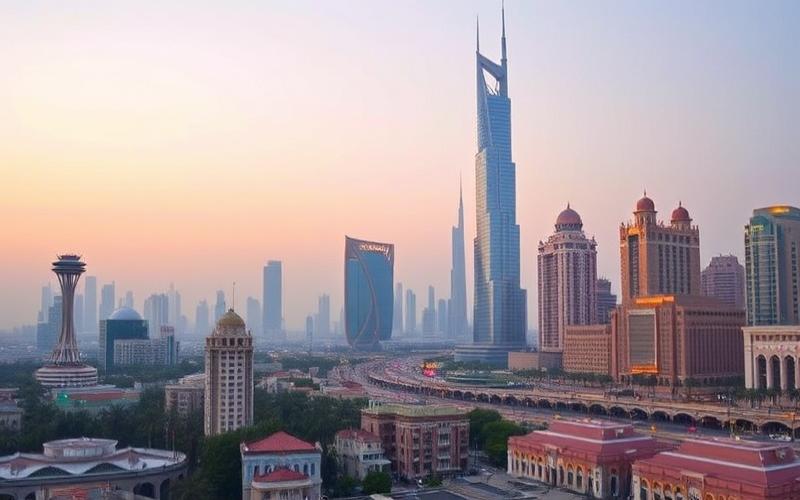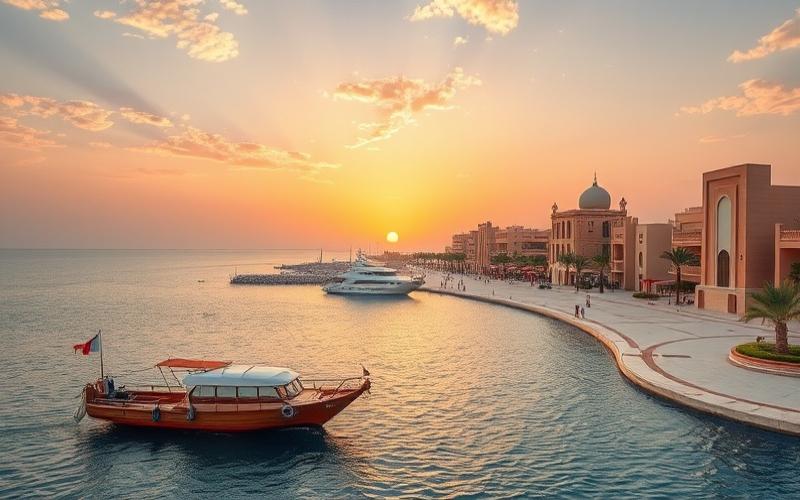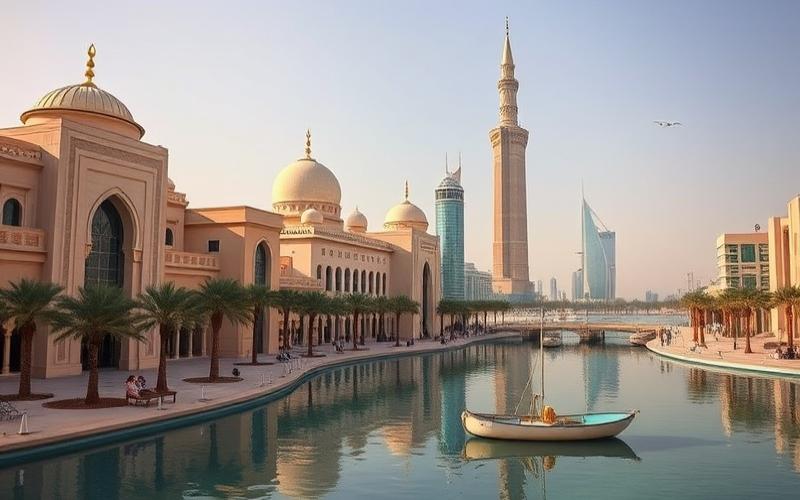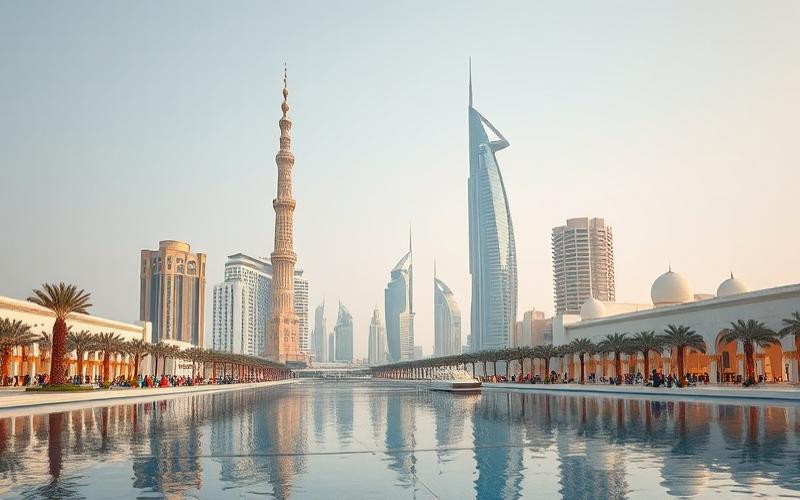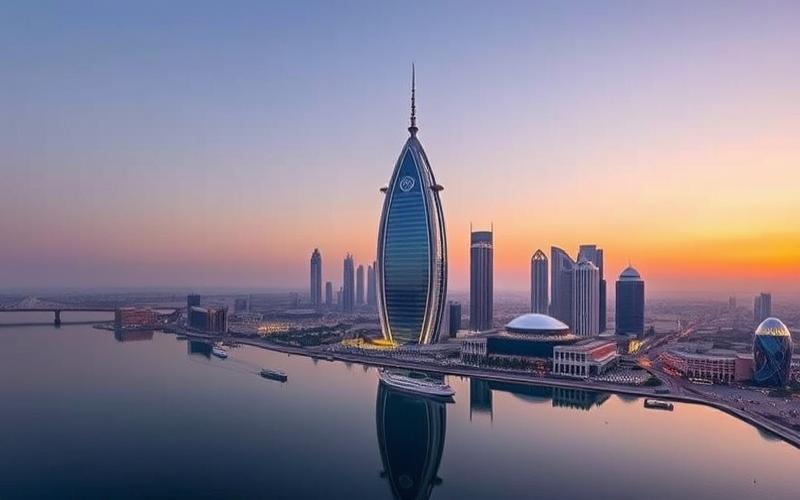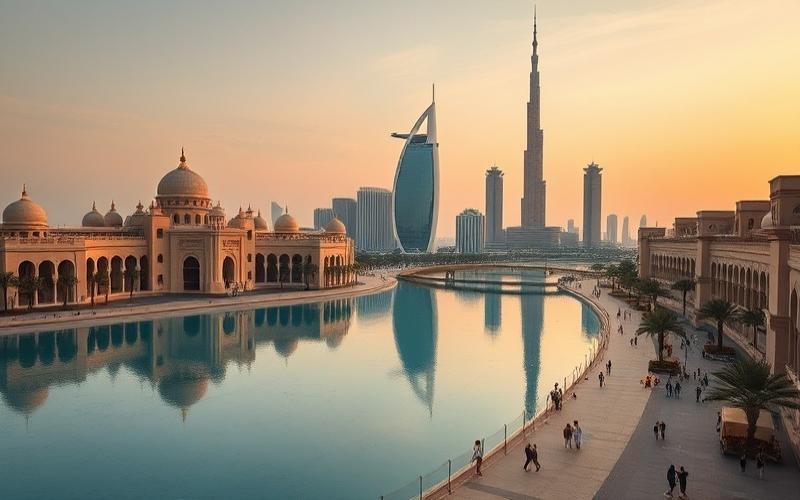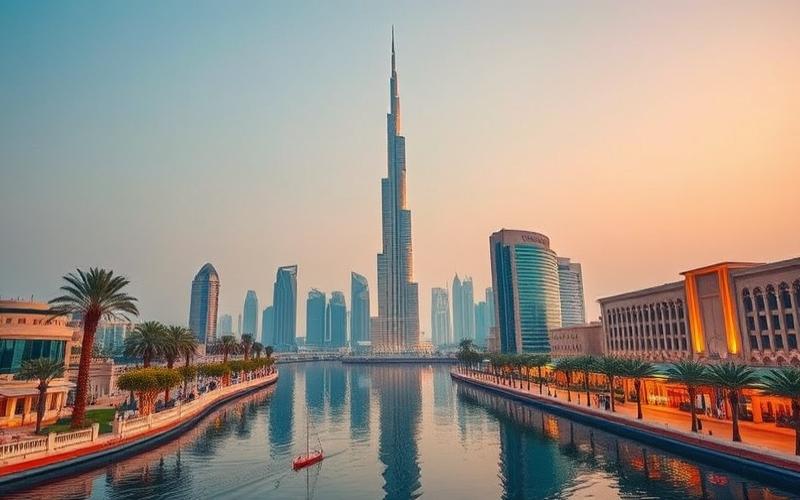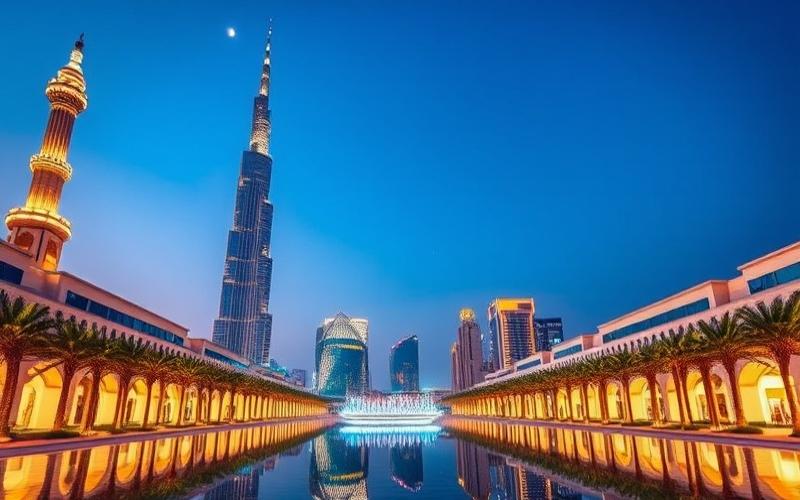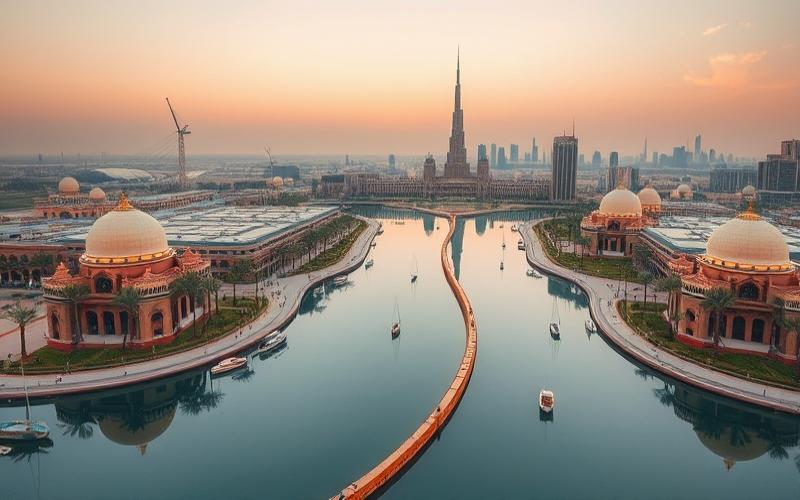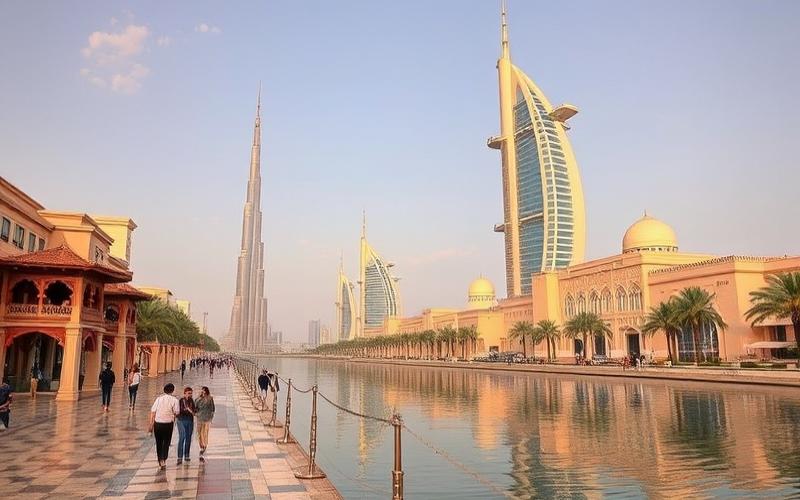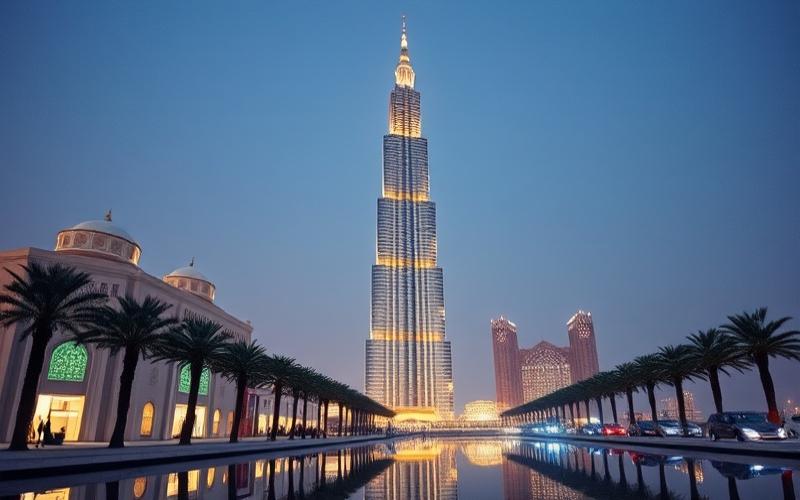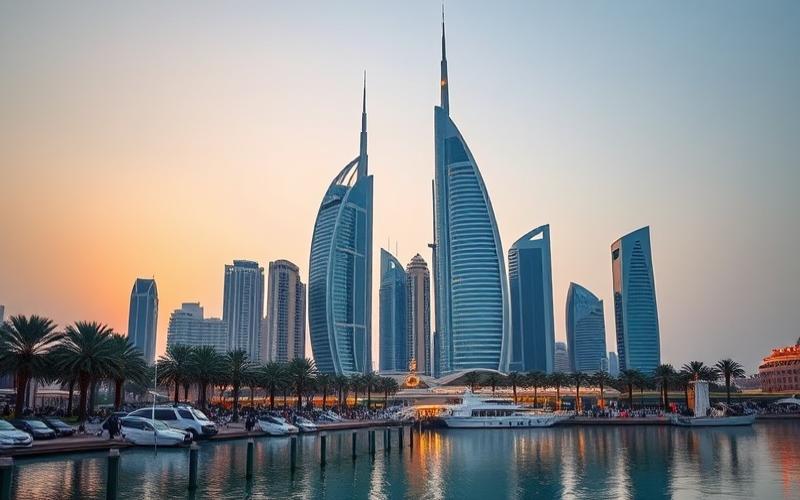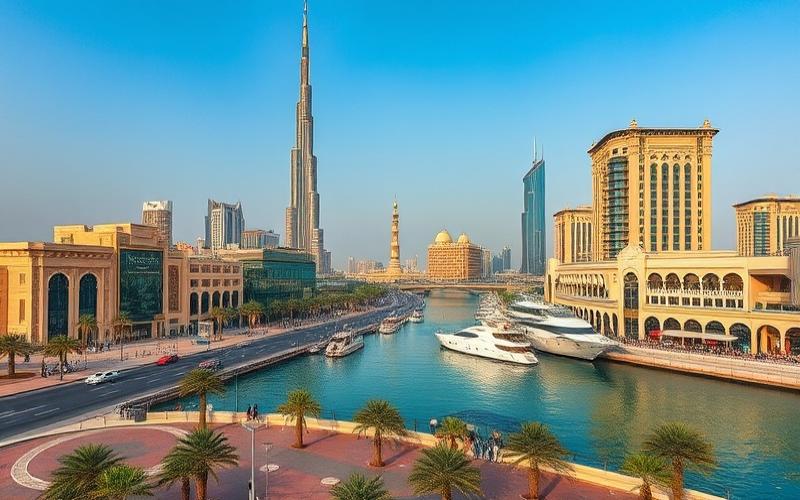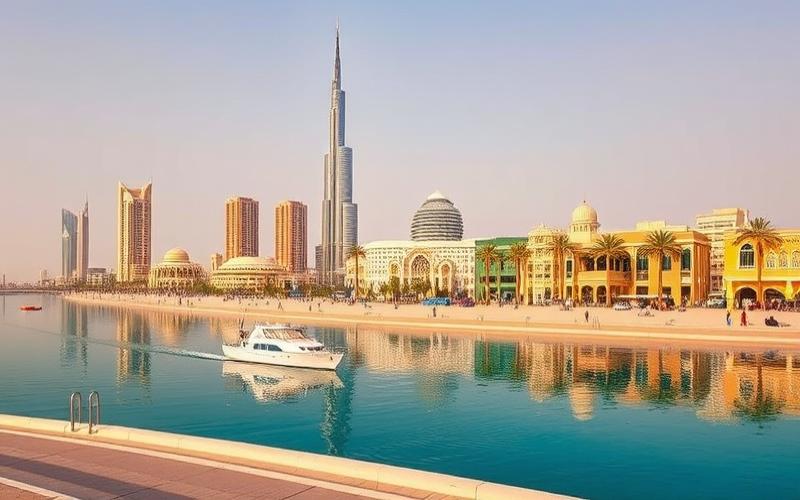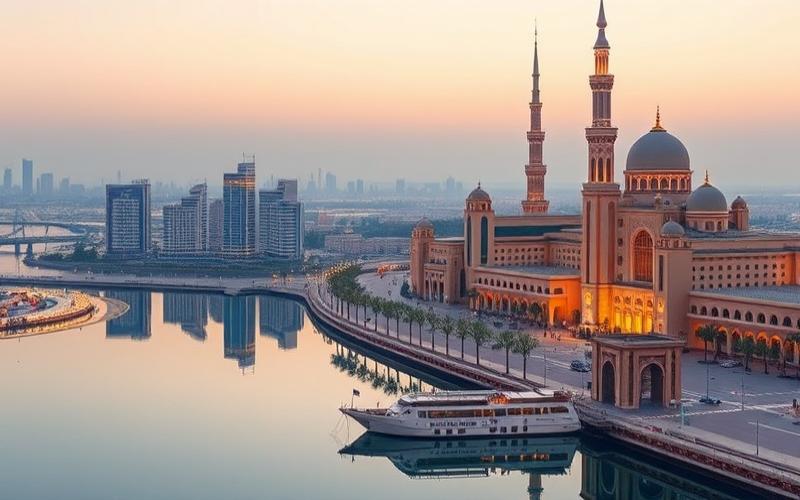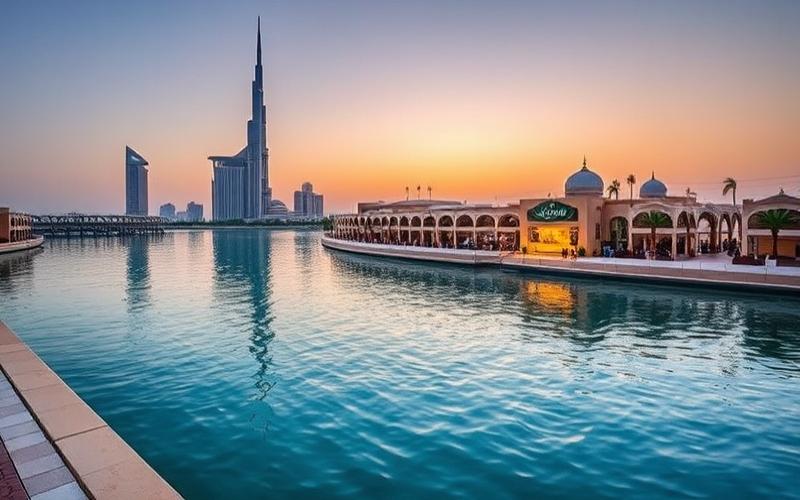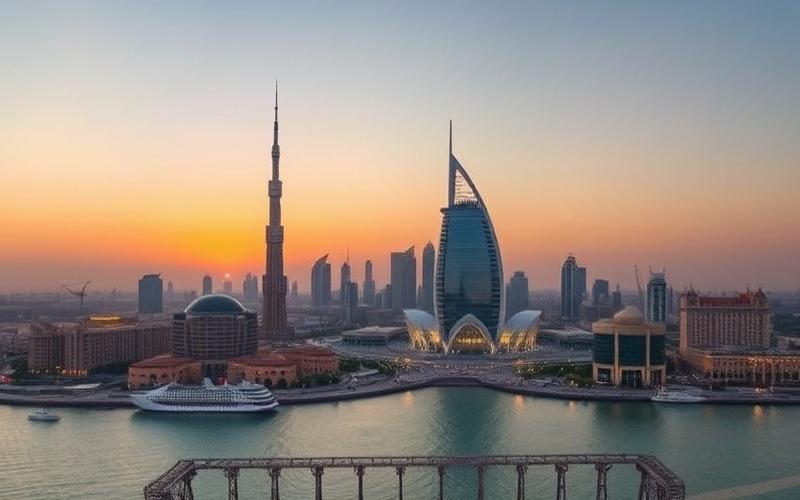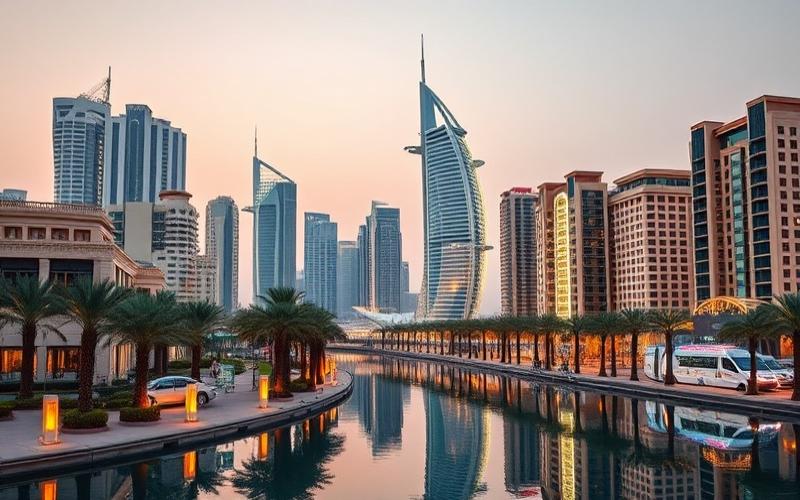
 Published on and written by Cyril Jarnias
Published on and written by Cyril Jarnias
Dubai, the quintessential cosmopolitan city, offers a unique culinary experience that blends ancient traditions with gastronomic innovations. For expatriates newly arrived in this vibrant metropolis of the United Arab Emirates, exploring the local food scene is an exciting adventure that allows immersion into the host country’s culture. This guide will take you through Dubai’s iconic flavors, from traditional markets to trendy restaurants, including essential dining etiquette rules.
The Richness of Emirati Cuisine
Dubai’s gastronomy draws its roots from traditional Bedouin cuisine while incorporating Persian, Indian, and Levantine influences. This unique fusion creates flavorful dishes that reflect the region’s history and geography.
Must-Try Local Dishes
Among the specialties not to miss are:
- Al Machboos: spiced fragrant rice served with meat (lamb, chicken, or fish)
- Shawarma: grilled meat slices wrapped in pita bread with vegetables and sauce
- Hummus: creamy chickpea dip served as an appetizer
- Moutabal: mashed grilled eggplant mixed with tahini
- Luqaimat: small fried dough balls drizzled with date syrup
These dishes form the heart of Emirati cuisine and are ubiquitous in both traditional restaurants and households. Tasting them helps understand the subtleties of local flavors and appreciate the importance of sharing and conviviality in Dubai’s culinary culture.
Good to Know:
Emirati cuisine is characterized by generous use of spices like saffron, cardamom, and cumin, as well as the importance given to dates, considered a sacred food.
Traditional Markets: A Sensory Immersion
To truly grasp the essence of local gastronomy, nothing beats a visit to Dubai’s traditional souks and markets. These lively places offer a unique sensory experience and allow discovery of the fresh ingredients that compose Emirati cuisine.
The Spice Souk
Located in Deira, the Spice Souk is a true paradise for flavor enthusiasts. You’ll find a multitude of colorful spices, aromatic herbs, dried fruits, and local products like incense. It’s the ideal place to buy authentic ingredients and soak up Dubai’s traditional atmosphere.
Deira Fish Market
This bustling market offers a wide variety of fish and seafood freshly caught from the Persian Gulf. It’s an opportunity to discover local species like hammour (grouper) or sultan ibrahim (red mullet), and observe typical regional bargaining techniques.
Waterfront Market
This modern market offers a more contemporary experience while maintaining the authenticity of local products. You’ll find stalls of fruits, vegetables, meats, fish, and spices in an air-conditioned and hygienic environment.
Visiting these markets not only allows discovery of local cuisine’s basic ingredients but also immersion into the lively, colorful atmosphere that characterizes daily life in Dubai.
Good to Know:
Don’t hesitate to ask vendors for advice on using spices and local ingredients. They’ll be happy to share their knowledge and traditional recipes.
Iconic Restaurants: Between Tradition and Modernity
Dubai offers an exceptional culinary scene that combines traditional restaurants with world-renowned gourmet establishments. For expatriates eager to discover local cuisine in all its splendor, here are some essential addresses:
Al Fanar Restaurant & Cafe
This restaurant offers total immersion into Emirati culture, both through its decor and menu. You can enjoy traditional dishes like machboos or thereed in a setting that evokes 1960s Dubai.
Orfali Bros Bistro
Ranked number one on the MENA’s 50 Best Restaurants list in 2025, this restaurant run by three brothers offers innovative cuisine that reinvents Middle Eastern flavors. It’s the perfect place to discover a modern interpretation of local gastronomy.
Bait Maryam
This family restaurant offers authentic and warm Levantine cuisine. Chef Salam Dakkak presents recipes passed down through generations, like kabab hamoudi, a kebab rolled in homemade bread and served with smoked moutabal.
BOCA
Awarded for its sustainable approach to gastronomy, BOCA offers Mediterranean cuisine that highlights local products. It’s an opportunity to taste innovative dishes like kingfish served with a spicy local tomato gazpacho.
These establishments illustrate the diversity of Dubai’s culinary scene, where tradition and innovation harmoniously coexist. They offer expatriates the opportunity to discover the richness of local gastronomy in varied settings, from the most authentic to the most contemporary.
Good to Know:
Most high-end restaurants in Dubai offer Friday brunches, the weekly day of rest. It’s an excellent opportunity to taste a wide variety of local and international dishes in a festive atmosphere.
Dining Etiquette: Essential Codes to Know
To fully integrate into the local culture, it’s essential to know the etiquette rules governing meals in Dubai. These codes vary depending on the context, whether family, professional, or formal.
In a Family Context
- It’s common to eat sitting on the floor on carpets or cushions
- Typically, use the right hand for eating, as the left is considered impure
- It’s polite to taste all dishes offered
- Leaving a little food on your plate is a sign of politeness, indicating the host was generous
In a Professional Context
- Business meals are often long and serve as opportunities to build relationships
- It’s important to wait for the host to start eating before serving yourself
- Avoid discussing business at the beginning of the meal; wait for your counterpart to bring up the subject
- Alcohol is generally not served during business meals, except in international hotels
In a Formal Context
- Arrive on time or slightly late (10-15 minutes maximum)
- Dress elegantly and respectfully of local traditions
- Wait to be shown your place at the table
- Avoid categorically refusing a dish, even if you don’t eat it
It’s important to note that during Ramadan, the rules change significantly. Most restaurants are closed during the day, and eating, drinking, or smoking in public is prohibited from sunrise to sunset.
Good to Know:
In traditional contexts, it’s common for men and women to eat separately. As an expatriate, you’ll be informed of the procedure if such separation is in place.
Contemporary Culinary Trends in Dubai
Dubai, a constantly evolving city, sees its gastronomic scene continuously reinvent itself. Curious expatriates can discover innovative culinary trends that reflect the city’s dynamism.
Fusion Cuisine
Many talented chefs combine traditional Middle Eastern flavors with international techniques and ingredients. This fusion gives birth to unique dishes that embody Dubai’s cosmopolitan spirit.
Sustainable Gastronomy
Following the example of BOCA restaurant, more establishments are emphasizing the use of local and sustainable products. This trend allows rediscovery of traditional ingredients while supporting local agriculture.
Immersive Culinary Experiences
Some restaurants offer experiences beyond simple dining. Sky-high dinners, underwater restaurants, or desert meals provide unforgettable moments combining gastronomy and spectacle.
Reimagined Street Food
Food trucks and night markets are gaining popularity, offering creative versions of local and international street food. It’s an opportunity to taste reinvented shawarmas or falafels with unexpected flavors.
These trends illustrate Dubai’s ability to innovate while respecting its culinary traditions. They offer expatriates new ways to explore local gastronomy in often surprising settings.
Good to Know:
Many food festivals are organized throughout the year in Dubai, like the Dubai Food Festival. These events are the perfect opportunity to discover the city’s latest gastronomic trends.
Finding International Ingredients in Dubai
Although discovering local cuisine is exciting, expatriates sometimes feel the need to rediscover flavors from their home countries. Fortunately, Dubai offers many options for finding international ingredients.
International Supermarkets
Chains like Carrefour, Spinneys, or Waitrose offer a wide range of products imported from different countries. You can easily find European, American, or Asian ingredients there.
Specialty Grocery Stores
Many grocery stores specialize in products from a specific region. For example, 1004 Gourmet for Korean products, or Dean’s Fujiya for Japanese ingredients.
Producers’ Markets
The Ripe Market, held regularly in different locations around the city, is an excellent place to find fresh and artisanal products, including international specialties.
Online Stores
Sites like Kibsons or FreshToHome allow ordering a wide variety of fresh and grocery products, including hard-to-find ingredients, delivered directly to your home.
Thanks to these different options, expatriates can easily alternate between local and international cuisine, thus enriching their culinary experience in Dubai.
Good to Know:
Don’t hesitate to ask other expatriates or locals for advice on finding specific ingredients. Dubai’s expatriate community is generally very supportive and willingly shares good addresses.
In conclusion, discovering local gastronomy in Dubai is an exciting adventure that allows expatriates to fully immerse themselves in their host country’s culture. From traditional markets to innovative restaurants, including essential etiquette rules, this guide offers a comprehensive overview of Dubai’s culinary scene. By exploring these different facets, expatriates can not only satisfy their gustatory curiosity but also create lasting bonds with the local community through sharing meals and unique gastronomic experiences.
Disclaimer: The information provided on this website is for informational purposes only and does not constitute financial, legal, or professional advice. We encourage you to consult qualified experts before making any investment, real estate, or expatriation decisions. Although we strive to maintain up-to-date and accurate information, we do not guarantee the completeness, accuracy, or timeliness of the proposed content. As investment and expatriation involve risks, we disclaim any liability for potential losses or damages arising from the use of this site. Your use of this site confirms your acceptance of these terms and your understanding of the associated risks.

